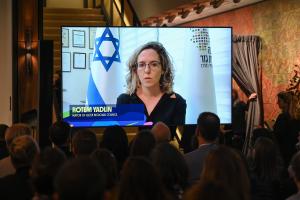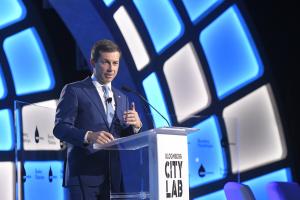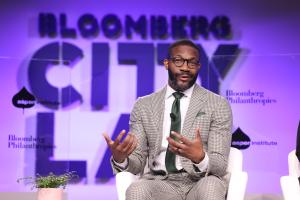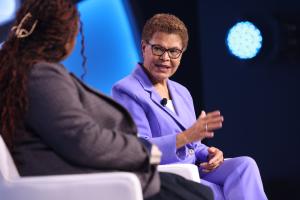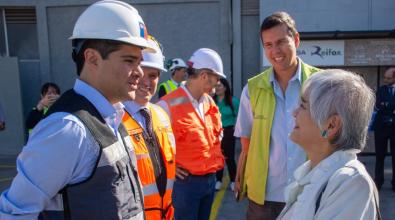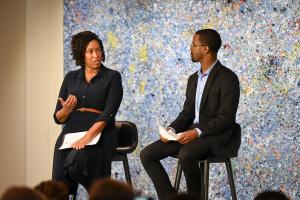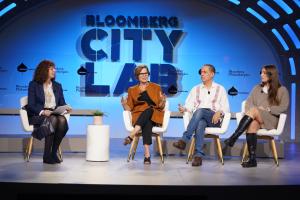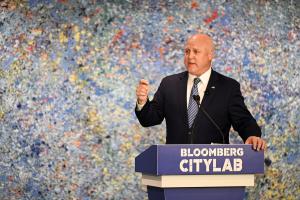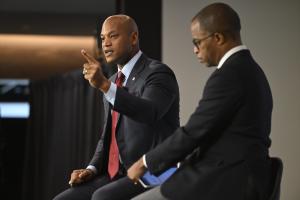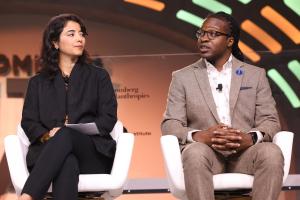 Read More
Read More
10 memorable moments from Bloomberg CityLab 2023

The 10th Bloomberg CityLab summit took place in Washington, D.C., last month. For the participating mayors, city innovators, urban experts, artists, business leaders, and advocates, it was a time to share ideas for solving tough challenges and raise ambitions for many opportunities ahead. Here are 10 of the most memorable moments from the summit.
Israeli mayors speak from the frontlines of war.
With Israel in the throes of war, and on the same day that President Joe Biden was in Tel Aviv to meet with the country’s leaders, two Israeli mayors addressed CityLab attendees from their hometowns. Both paid tribute to Sha’ar Hanegev Mayor Ofir Liebstein, who was killed protecting his community, and shared their own experience on the ground. “We talk about the trauma [of the war], but also as a mayor I think about the houses that were burned down, the infrastructure that’s been ruined,” said Rotem Yadlin, mayor of the Gezer Regional Council. “How do you rebuild a community that has been through a trauma such as this one? This is the main question I keep thinking about in my head.”
Mayor Alon Davidi of Sderot, the Israeli city closest to the Gaza border, added, “I am actually a mayor of no citizens, because most of my citizens had to evacuate the city.” And, even though most of his residents are now in other places throughout the country, “My job is [still] to take care of my people…to give them all that I can to help them.” (Watch the video.)
Tackling shared goals one city at a time.
“Back when I was mayor [of South Bend, Ind.], I believed that local government was the most dynamic and indispensable level at which to get things done,” U.S. Secretary of Transportation Pete Buttigieg told those gathered at CityLab. “Now that I’m in Washington, D.C., I know this to be true.” All joking aside, Buttigieg described how local governments can be the foundation for setting and achieving national objectives, including the Department of Transportation’s commitment to Vision Zero—a target of zero roadway deaths.
While “some people would scoff” that the goal of zero deaths was too “pie-in-the-sky,” successes in individual cities have helped reframe the conversation and make him comfortable in committing to a lofty, but worthy, goal. “The thing that really let me know that it was possible and necessary to embrace the vision of zero was that, even though we couldn’t say that it would happen in the United States at a national level the next year or the year after, we could see that it had already happened in cities” like Hoboken, Jersey City, Edina, Minn., and Evanston, Ill.
“And when you see that happen, then you’re having a completely different conversation. It’s one thing to say, ‘How do we get to this abstract goal of zero deaths across the country someday?’ It’s another to say, ‘Last year, the biggest American city that had zero deaths had 50,000 people in it. What if next year, the biggest American city to have zero deaths had 60,000 or 70,000 people in it?’ What if the number of cities that had zero deaths grew every year? Goals that are still ambitious, but also goals that you can get your arms around. And of course, to make this work, these goals have to be made real somewhere in particular. That all has to come from the local.” (Watch the video.)
Spreading great ideas between cities.
As Bloomberg Philanthropies announced the creation of the Bloomberg Cities Idea Exchange to accelerate the spread of successful civic solutions between cities, those at CityLab explored the importance of idea sharing and how those efforts can be more successful. Birmingham, Ala., Mayor Randall Woodfin said that looking to other cities for inspiration has been one of the keys to recent successes in his city. “The ideas that are happening—and the solutions that are being created—in cities are infinite,” he explained, highlighting Providence Talks, a Mayors Challenge-winning idea from Providence, R.I., that Birmingham borrowed and built upon to boost early-childhood education. “It’s important for any of us that serve as mayor to always be in the business of literally pulling best practices, ideas, and solutions—and the best way to find them is from other mayors who have been doing the work.”
Bloomberg Philanthropies’ Ryan Pierce, who is leading the organization’s work on the Bloomberg Cities Idea Exchange, emphasized that successful replication is never “copy and paste.” “Borrowing good ideas must be an innovation activity,” he explained. “You still need to do the really fun and really hard work of knowing the problem inside and out in your city, engaging your residents, and then modifying the program. We have to make these solutions work in your city and in your local context.” (Watch the video.)
Emphasizing services in the fight against homelessness.
Los Angeles Mayor Karen Bass, who, on her first day in office last December, declared a state of emergency to tackle homelessness, spoke with The Atlantic’s Jerusalem Demsas, about her city’s efforts to help its 46,000 unhoused residents.
“I believe in ‘housing first,’ but I would say, ‘housing and services first,’” Bass explained. “The ‘services’ piece is woefully lacking, and there needs to be a fusion between housing, healthcare, basic primary care and other forms of social services. It’s not OK to take someone off the streets, put them in a hotel, and then two weeks later have a social-work visit….There needs to be a basic standard, and that standard is that the day you leave a tent, you get a full physical, with labs, and a meeting with your social worker. We want [people] to be in housing and we want it to last.” (Watch the video.)
Dismantling barriers to affordable housing.
With housing affordability at historic lows and interest rates at record highs, it’s time for cities to act, said San Francisco Mayor London Breed. “We have to do something different, she said. “We can’t be stuck in the past when it comes to building housing now.” For Breed, that means “chipping away at layers of regulations, impact fees, and redundant policies” that get in the way of approving and building new affordable housing units. “San Francisco has approximately 50,000 units that were approved before I was even an elected official,” Breed said, adding that her administration’s focus has taken what was a 10-year process when she took office and reduced it to approximately three years. “My goal in trying to get housing built in San Francisco is to be very aggressive about our policies. We’ve got to get to yes, and we’ve got to get regulation out of the way of housing production if we want to deal with the challenges of the future.” (Watch the video.)
Driving people into downtowns—and into local government.
With cities everywhere looking to inject life into downtown cores still struggling after the 2020 shift to remote work, Washington, D.C., Mayor Muriel Bowser told CityLab that the nation’s capital is investing in an aggressive commercial-to-housing conversion with the goal of adding 15,000 residents to its downtown. “Every mayor here knows that we’re not going back to 2019,” she said. “Our downtowns won’t be exactly the same. Hybrid work is likely here to stay…. So we are very focused on bringing more people downtown to live and different ways to repurpose our properties.”
D.C. also is looking to bring new people into local government, Bowser said, announcing a new initiative—the Historically Black Colleges and Universities (HBCU) Public Service Program in partnership with Howard University and the University of the District of Columbia—aimed at creating a pipeline for students to pursue roles in public service. people come to DC. “People come to universities like Howard and U.D.C. because they want to be a part of public service. They have a change-the-world mindset,” she said. “You can do that in local government. And, we want people to know that they don’t have to move away to do it.” (Watch the video.)
Demonstrating the power of city-driven digital ecosystems.
As cities move more of their service delivery online, those gathered last week explored the benefits of driving these efforts in house, rather than through vendors. After all, “who knows your cities and its needs better than you and your residents?” Bloomberg Philanthropies’ Claudia Juech asked. Building internal talent and capacity have been key to the success of Mexico City’s digital transformation, which, over the past five years, has made 75 percent of all city services available online. “We have created more than 330 digital products and services, which would have a market value of more than $100 million if we contracted them with providers,” said José Merino, who leads the city’s Digital Agency for Public Innovation.
Jennifer Pahlka, founder of Code for America and author of “Recoding America: Why Government is Failing in the Digital Age and How We Can Do Better,” recommended that cities without the internal resources of Mexico City “think about the core capabilities and capacities you need to have in house in order to have a healthy vendor system and be in control of your own destiny.” (Watch the video.)
Seizing the opportunity of once-in-a-generation infrastructure funding.
Nearly two years after the historic passage of the Bipartisan Infrastructure Law, White House Senior Advisor and Infrastructure Coordinator Mitch Landrieu told those gathered at CityLab, “You can ask us how we’re doing…. We’ve pushed $300 billion out the door and we have 38,000 projects coursing across America.”
Landrieu, the former mayor of New Orleans, shared how these infrastructure investments can serve as the “the great equalizer,” and, especially how their success depends on effective collaboration across all levels of government. “I have traveled over 120,000 miles. I have been to over 100 towns, cities, and tribal communities, working with each and every one of you to rebuild the country,” he said. “Because, at the end of the day, this is what I learned helping rebuild the city of New Orleans [after Hurricane Katrina]: It works when we all come together.” (Watch the video.)
Using data to rethink how states can support cities.
Ten months into his first year as an elected official, Maryland Governor Wes Moore told city leaders that he plans to shake up the way his state supports local communities—shifting from “peanut-butter politics,” where a little funding is spread everywhere, to a place-based investment strategy. “We’re going to take a look at the most challenged, Census-tracked, ZIP code areas and ask, ‘What would it look like if we flooded these areas with resources?’” Moore said. “What would it look like if we took neighborhoods that have been chronically and historically neglected and said, ‘We’re going to prioritize them—unapologetically?’”
The work will be driven by data, Moore emphasized: “I am data driven and heart led. I wear my heart on my sleeve—and I acknowledge that—but I don’t move without data, and the data in Maryland is very clear about the most challenged communities in the state—urban, rural, and suburban.” (Watch the video.)
Building trust in local government.
“I used to think that ‘trust’ was a destination, that you got there,” said Krystal Reyes, chief resilience officer in Tulsa, Okla. “But now I understand that trust is an iterative process. It’s a choice every day to build trust and to do things that are trustworthy.” One of the ways Tulsa is building trust throughout the city is through “Equity Dialogues,” a program that has trained 80 Tulsans to facilitate 90-minute community conversations around racial equity. The purpose of these dialogues, Reyes explained, is not to get community sign-off on any specific proposal. Rather it’s to build connections across lines of difference and make communities stronger in the process.
Terrance Smith, a former innovation director of Mobile, Ala., who is now studying trust as a fellow at the Bloomberg Center for Public Innovation at Johns Hopkins University, explained that people who are deciding whether to trust an organization or city ask themselves three questions: Can they do what they say they’re going to do? Can they do it without harming me? And can they do it without me having to look over their shoulder every minute? “If they can answer those three questions [affirmatively] they will give you their trust and it will become a lot easier to operate.” (Watch the video.)
